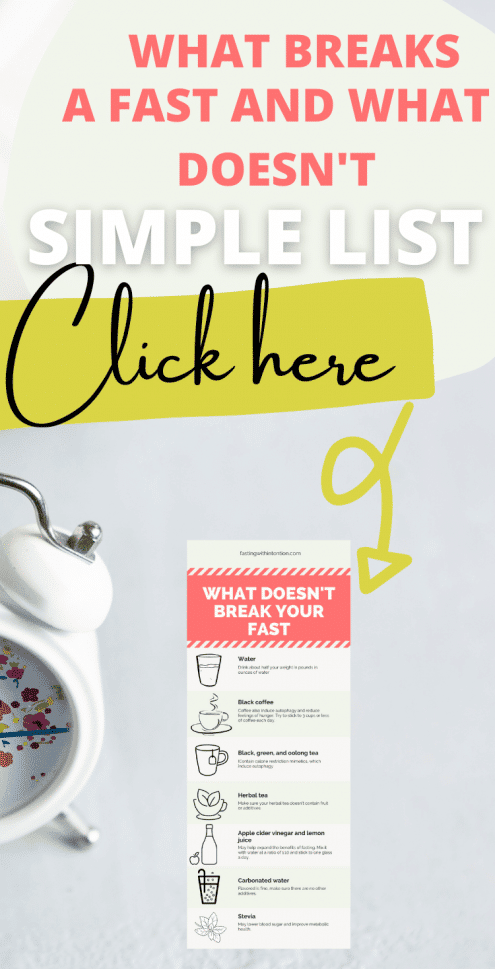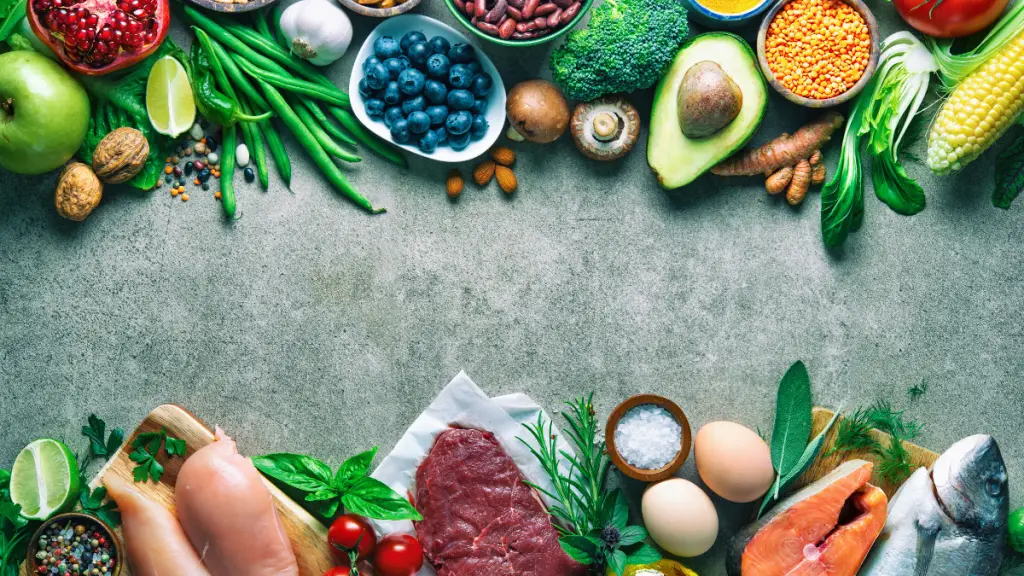More and more people are aware of the benefits of practicing intermittent fasting. Many get started to lose weight, but when it comes to achieving maximum healing benefits, many ask: Will I ruin my fast if I consume this or that? In this post, I will answer all the most frequently asked questions regarding what breaks a fast and what doesn’t. What you will consume will vary depending on your fasting goals and your intermittent fasting method.
Your Fasting Goals
Deciding what you will and will not consume during your fast will depend greatly on your fasting goals. If your goal is to give your digestive system a break, you must be stricter, as most beverages promote stomach acid production. However, since most of us want to fast for metabolic health, autophagy, and ketosis, some calories will be acceptable, as I will explain.

Fasting and Autophagy
Before we start with all the details of what breaks a fast and what doesn’t, I want to talk about autophagy quickly.
What Is Autophagy?
Fasting activates the process of autophagy. Autophagy is from the Greek language. Auto means “self,” and phagein means “eat.” Autophagy means your body is eating itself in the absence of food. Don’t worry! It’s a good thing because it is eating damaged and redundant cells. It inhibits cancer cells and aging, eliminates pathogens, and cleans the insides of cells. Autophagy is essential to improve lifespan and decrease your risks of various diseases, including Parkinson’s and Alzheimer’s. Learn more about fasting for health and longevity in my post 5 Steps to Fasting for Health and Longevity.
How Does Autophagy Work?
It is a common misconception that autophagy stops after consuming calories. Not true! Calorie restriction is enough to enable autophagy. Autophagy is controlled by the mechanistic target of rapamycin (mTOR). Your mTOR pathway is activated by hormones, growth factors, and the presence of nutrients such as glucose, fatty acids, and amino acids. Both fasting and calorie restriction cause stress on your body, limit the presence of food, and reduce growth factors. When your mTOR pathways are active, they tell your body not to bother with autophagy.
It looks like calorie restriction through intermittent fasting supports your circadian rhythm by following specific eating patterns, and that, in itself, inhibits your mTOR pathways. The point is, don’t worry so much about what breaks or does not break a fast. Instead, make sure you are consistent with intermittent fasting (or time-restricted feeding, as many prefer to call it).

Your Intermittent Fasting Method
Your chosen intermittent fasting method is another factor you can consider to decide what you will allow yourself to consume during your fast. For example, I recommend limiting yourself to very low-calorie beverages if you eat that day because you have at least one meal. I will go into the What Doesn’t Break Your Fast section. However, if you are practicing an intermittent fasting method that relies on calorie restriction to achieve autophagy, you can consume 25% of your regular calorie intake. In that case, a beverage with more calories, such as bone broth and bulletproof coffee, will be acceptable. Check this study to learn more about how subjects consumed 25% of their regular energy intake twice a week (the 5:2 method) and improved their metabolic health.
What Breaks a Fast
Let’s start with what breaks a fast. A simple way to look at it is this: If it has calories, it breaks your fast.
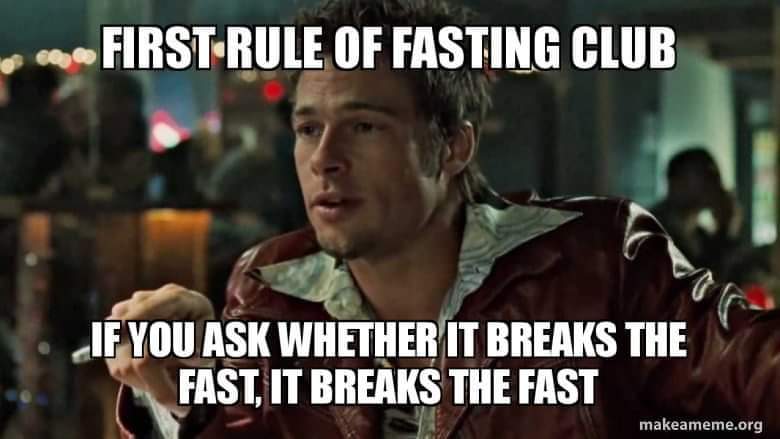
There is another way to look at it: If it doesn’t impact your blood sugar, it doesn’t technically break your fast. One way food activates your mTOR pathway is through the production of insulin. If your blood glucose remains stable, you are doing good. For example, if having a bulletproof coffee in the morning doesn’t impact your blood sugar, you could say you are still in a “fasted state.” Does this make sense? Technically, it breaks your fast, but in practice, as far as the benefits of fasting go, it doesn’t negate any of the benefits.
How to Know If Your Blood Sugar Stays the Same
Would you like to have a bulletproof coffee or maybe just coffee with coconut milk in the morning but are unsure if it will impact your blood sugar? I have an easy way for you to check. You can use a ketone/blood sugar monitor. If you are serious about fasting, I recommend you buy one. It’s interesting to check how fasting and your diet affect your ketones and blood sugar. It can also motivate you to have a number to go by. I use the Keto-Mojo, and I love it! Use my affiliate link, and you will receive a 15% discount. What’s not to like?

What Doesn’t Break Your Fast
Fasting experts agree you can drink the following without breaking your fast:
- Black coffee (only 2 calories in a cup): Coffee may even induce autophagy!
- Green, oolong, and black tea (2 calories in a cup): Contain calorie restriction mimetics, which induce autophagy.
- Most herbal teas: Make sure they don’t contain additives and fruit.
- Apple cider vinegar (3 calories in 1 Tbsp)
- Stevia: May lower blood sugar and improve metabolic health.
- Carbonated water: Flavored is fine; make sure there are no other additives.
- Lemon juice
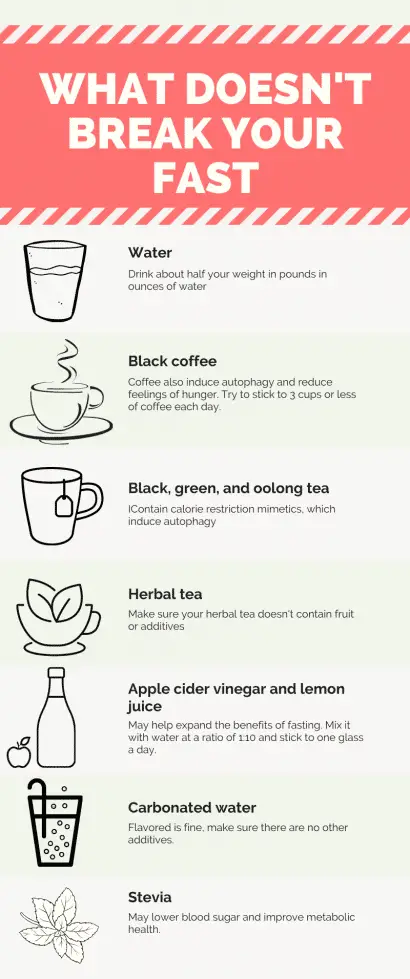
Your Intermittent Fasting Method
Your chosen intermittent fasting method is another factor you can consider to decide what you will allow yourself to consume during your fast. For example, if you are going to eat that day because you have at least one meal, I recommend limiting yourself to the very low-calorie beverages I listed in the What Doesn’t Break Your Fast section. To benefit from autophagy with calorie restriction, you must ensure you consume 25% or less of your regular calorie intake. For example, this study showed that Alternate Day Fasting improved metabolic health when subjects consumed 25% of their regular energy intake (the 5:2 method).
Modified Fasting
The calorie restriction doesn’t have to be as severe to benefit from autophagy when fasting for longer. For example, Dr. Valter Longo has found that eating 40% to 50% of your regular calorie intake for 5 days creates a sufficient deficit to inhibit mTOR pathways. Check my 5-day and my 10-day modified fast menu plans to learn more.
Also, check out my Intermittent Fasting 101 Workshop to learn more about my approach to intermittent fasting.
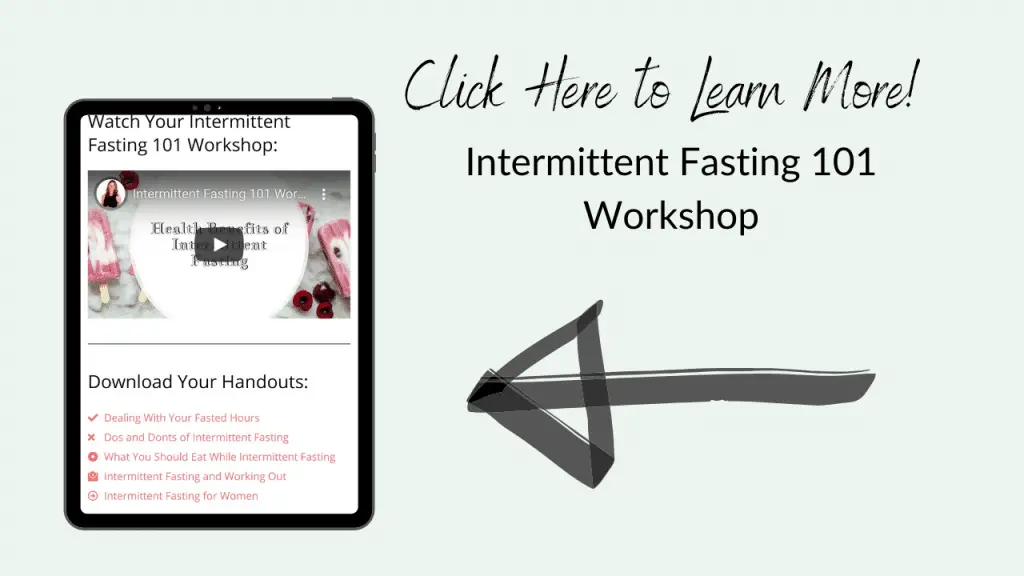
Frequently Asked Questions
I have given you all the information you need already, but this section goes into greater detail to explain the common question people ask about what breaks a fast.
Does coffee break a fast?
All fasting experts agree that having black coffee is fine during fasting. Not only is the number of calories it contains negligible, but it also induces autophagy. Moreover, studies show that subjects still benefit from intermittent fasting when they drink black coffee or tea.
Does Bulletproof coffee break a fast?
Bulletproof coffee contains significantly more calories than black coffee (often close to 500 calories!). In that case, it does indeed break your fast. However, bulletproof coffee is fine if your goal is to benefit from ketosis and autophagy. Bulletproof coffee contains only fats. You will remain in ketosis as fats typically don’t cause an insulin spike. Just be aware that insulin resistance may be induced by too much dietary fat, according to some studies. This isn’t an issue if you are on the keto diet, but if you eat a lot of carbs, fat may interfere with the transport of glucose to your muscles.
Does apple cider vinegar break a fast?
Again, the number of calories in apple cider vinegar is low enough to not worry about it breaking your fast. Coffee and apple cider vinegar promotes the production of an enzyme called AMP-activated protein kinase (AMPK). AMPK activation helps expand the benefits of fasting. Most studies examining the benefits of intermittent fasting allow the subjects to drink coffee, tea, apple cider vinegar, and lemon juice. Moreover, apple cider vinegar may help reduce your cravings while fasting. Mix it with water at a ratio of 1:10 and stick to one glass daily.
Does lemon juice break a fast?
A tablespoon of lemon juice in water is fine, but remember that 3 (6 tablespoons) ounces of lemon juice contain as much as 6 grams of carbs. Like apple cider vinegar, I recommend you stick to 1 tablespoon a day or less.
Does stevia break a fast?
According to this study, stevia may help lower your blood sugar by 18%. Several studies, including the American Diabetes Association, show that stevia does not raise blood sugar or insulin levels. Furthermore, since it doesn’t contain calories, it’s ok to consume while fasting. One caveat: Many health experts recommend you practice appreciating foods that are not sweetened by giving up all sweeteners, including stevia.
Does gum break a fast?
You can chew gum while fasting. Make sure you pick a gum sweetened with a natural calorie-free sweetener like stevia. Remember, anything with minimal calories is generally acceptable when you fast.
Does bone broth break a fast?
Again, any food or beverage that contains calories technically breaks a fast, but bone broth may be fine depending on your fasting goals, as it most likely won’t take you out of ketosis. I would recommend measuring your ketone and glucose levels to check.
Does fat break a fast?
Some healthy fats like coconut oil, coconut milk, butter, or cream in your coffee are most likely fine. Again, I would try to limit them as I would bone broth unless you are practicing the 5:2 method, in which case you would add the calories you are using with these fats to your overall calorie count.
What Breaks a Fast and What Doesn’t Video
In Summary
If you want to be a purist when you fast, drink only water. However, consider what breaks fat and what doesn’t think of what you are trying to accomplish. If your goal is weight loss and autophagy, you have some leeway. I hope the information I provided you with in this post is clear enough to help you sort things out in your mind. Now, YOU can decide what you will consume when you fast.
